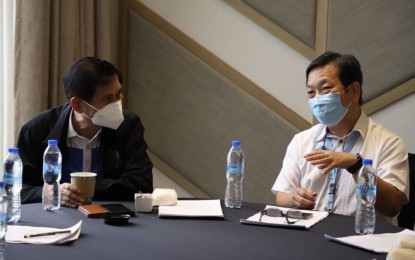
"NEW ECONOMY'. Cebu Chamber of Commerce and Industry president Felix Taguiam (right) and Cebu Covid-19 response overseer, Environment Secretary Roy Cimatu, during a meeting in Cebu in July 2020. Taguiam, who spoke during the Dagyaw 2020 on Thursday (Nov. 5, 2020), said the CCCI is upskilling and retooling both workers and businesses to prepare them for the "new economy" in the post-Covid era in Cebu. (Photo courtesy of Minerva Newman)
CEBU CITY – The Cebu Chamber of Commerce and Industry (CCCI) is closely working with the government to bolster the “new economy” by upskilling and retooling both workers and businesses to prepare them for the post-coronavirus disease 2019 (Covid-19) era, a business leader has said.
CCCI president Felix Taguiam said the province’s business community has been working to adapt to the new normal while ensuring that they adhere to the protocols set by the government during the economic restart.
“Our ongoing advocacy on the Cebu economic revival, together with the Cebu LGU (local government unit), to jumpstart the economy is an indication of our desired outcome of balancing life and livelihood,” Taguiam told the participants of the Dagyaw 2020 on Thursday.
The Dagyaw 2020 is a series of dialogues and consultations between the government and the different sectors in Central Visayas.
Speaking at the virtual forum, government leaders here cited the need to revive the local economy to bring back the jobs that were lost and businesses that closed due to the Covid-19 lockdowns.
Taguiam called for stronger collaboration between the private and public sectors, especially in terms of helping the economy to recover.
He also urged the government to provide policy leeway to businesses amid the health crisis to help them recover.
“Under the new normal, we are ramping up our efforts to regain our economic growth,” Taguiam said, adding that it is “just a matter of time” before the economy gradually starts to pick up.
Leocadio Trovela, Department of the Interior and Local Government (DILG) 7 (Central Visayas) director, said engaging the various sectors to get involved in participatory governance to address issues and concerns, especially on the economy, was one of the core objectives of the Dagyaw 2020.
The dialogues were aimed at identifying the needed interventions from the government to address the social and economic impact of Covid-19, Trovela said.
Different multi-sectoral representatives of the region’s four provinces had the opportunity to engage with the government and elevate their issues and concerns in their localities during Thursday’s physical and virtual town hall meeting.
The Dagyaw 2020, which was branded as “Usapang Lokal: A Regional Sectoral Dialogue” in Central Visayas, provided participants with the platform to express their varying viewpoints and suggest strategies to resolve issues and concerns.
Participants included representatives of various civil society organizations, regional line agencies, LGUs, the private sector, government information officers, other civil society groups, and the media.
The Central Visayas leg of the government-led forum centered on livelihood programs and services, as well as job opportunities, as the country shifts from the response phase to the recovery and rehabilitation phase amid the pandemic.
Only half a day of this year’s Dagyaw was allocated for the regional town hall meeting as the afternoon session was devoted to a workshop on the crafting of the regional multi-sectoral agenda based on what transpired during the morning session.
Apart from the exhaustive and healthy exchange of viewpoints on various national policies and programs among stakeholders, as well as the chance to raise the participants’ stand on several issues, the session facilitated a discourse on recommendations for the crafting of laws and policies.
The regional event is an undertaking of the Participatory Governance Cluster, through the DILG, which spearheads the regional dialogues in partnership with the Department of Budget and Management and the Presidential Communications Operations Office.
The conduct of the Dagyaw 2020 is also in observance of the country’s membership in the International Open Government Partnership. (PNA)
